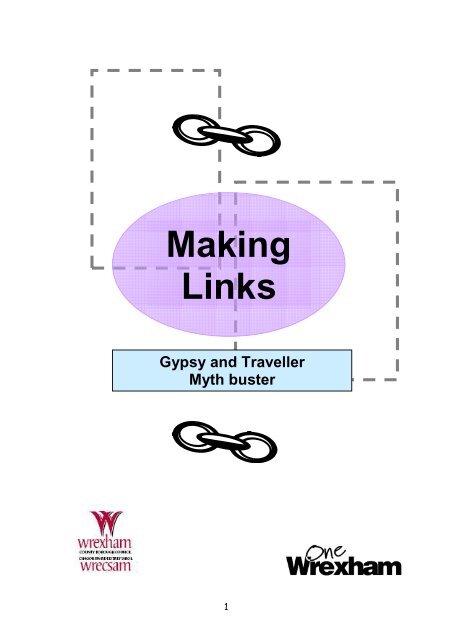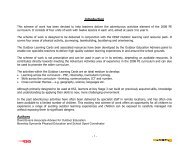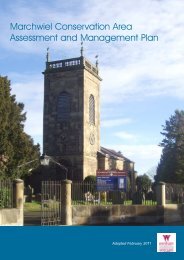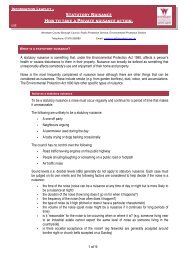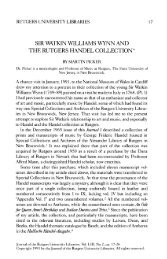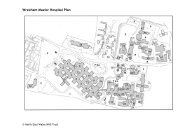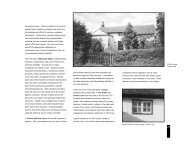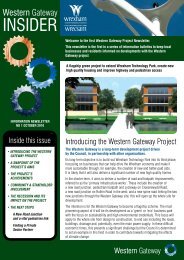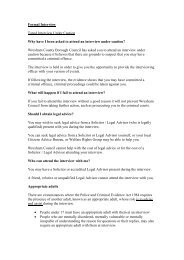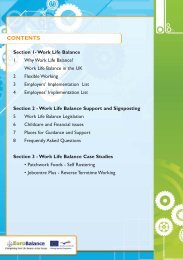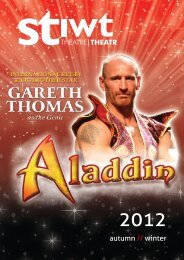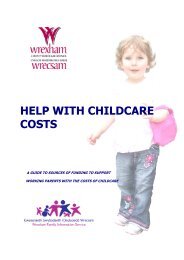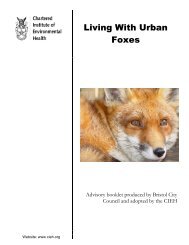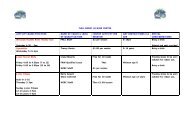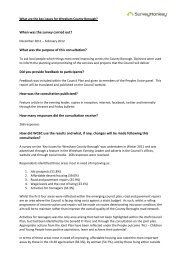Gypsies and Travellers - Wrexham County Borough Council
Gypsies and Travellers - Wrexham County Borough Council
Gypsies and Travellers - Wrexham County Borough Council
- No tags were found...
Create successful ePaper yourself
Turn your PDF publications into a flip-book with our unique Google optimized e-Paper software.
MakingLinksGypsy <strong>and</strong> TravellerMyth buster1
<strong>Wrexham</strong> Gypsy <strong>and</strong> Traveller Multi Agency ForumThe <strong>Wrexham</strong> Gypsy <strong>and</strong> Traveller Multi Agency Forum is a multi agency groupcommitted to sharing best practice <strong>and</strong> raising awareness of Gypsy <strong>and</strong>Traveller issues across public <strong>and</strong> voluntary <strong>and</strong> community organisations.This leaflet has been produced to by the Forum as a desk top exercise toprovide general answers to some commonly asked questions about <strong>Gypsies</strong><strong>and</strong> <strong>Travellers</strong>. It is purely a literature review of the existing information <strong>and</strong> assuch is not necessarily an accurate reflection of the needs, values or wishes oflocal <strong>Gypsies</strong> <strong>and</strong> <strong>Travellers</strong>.The need for this information was identified at a Gypsy <strong>and</strong> Travellerconference organised by the Multi Agency Forum in March 2007. Its productionis seen as a first step to providing better information for local practitioners whowork with this community. It will also help those who need support whenconsidering how their services could be made more accessible to <strong>Gypsies</strong> <strong>and</strong><strong>Travellers</strong>.We recognise that this is not a solution to our information needs. It is ourintention to work with the community over the coming months to develop aninformation resource that articulates what the community itself wishes to say,particularly in relation to access to services. This will provide an authentic voicefor <strong>Gypsies</strong> <strong>and</strong> <strong>Travellers</strong> in <strong>Wrexham</strong> <strong>and</strong> will therefore support servicedevelopment <strong>and</strong> Equality Impact Assessments.Membership of the <strong>Wrexham</strong> Gypsy <strong>and</strong> Traveller Multi Agency Forumincludes:• North Wales Police• <strong>Wrexham</strong> Local Health Board• <strong>Wrexham</strong> Citizens Advice Bureau• WCBC - Traveller Education Service, Housing Strategy, CommunityCohesion, Estate Management, Planning, Adult Social Care,• St Mary’s Roman Catholic Cathedral• Tai Clwyd Housing Association• Job Centre Plus• AVOW• Equalities <strong>and</strong> Human Rights Commission• Youth Offending Service• Community Mental Health TeamContact the <strong>Wrexham</strong> Gypsy <strong>and</strong> Traveller Multi Agency Forum:Email: onewrexham@wrexham.gov.uk2
Contents pageWho are <strong>Gypsies</strong> <strong>and</strong> <strong>Travellers</strong>? Page 4Why do <strong>Gypsies</strong> <strong>and</strong> <strong>Travellers</strong> travel? Page 5Gypsy <strong>and</strong> Traveller languages, culture <strong>and</strong> traditions Page 5Languages Page 5Hygiene Page 5Religion Page 5Where do <strong>Gypsies</strong> <strong>and</strong> <strong>Travellers</strong> live? Page 6Rights <strong>and</strong> responsibilities Page 6Do <strong>Gypsies</strong> <strong>and</strong> <strong>Travellers</strong> work? Do they pay taxes? Page 7Prejudice Page 7How do <strong>Gypsies</strong> <strong>and</strong> <strong>Travellers</strong> contribute to society? Page 7Are there any particular difficulties faced by <strong>Gypsies</strong> <strong>and</strong><strong>Travellers</strong>?Where can I find out more information about Gypsy <strong>and</strong>Traveller issues?Page 8Page 93
1. Who are <strong>Gypsies</strong> <strong>and</strong> <strong>Travellers</strong>?<strong>Gypsies</strong> <strong>and</strong> Irish <strong>Travellers</strong> are recognised in law as minority ethnic groups<strong>and</strong> are protected under the Race Relations Amendment Act [2000].Discrimination against them, as with other racial groups is unlawful. The <strong>Council</strong><strong>and</strong> other public bodies have a duty to promote good race relations <strong>and</strong> developimpact assessments. The term ‘racial group’ refers to groups defined by race,colour, nationality, <strong>and</strong> ethnic or national origins.Although often referred to as such, <strong>Gypsies</strong> <strong>and</strong> <strong>Travellers</strong> are not a singleethnic group. The phrase includes amongst others Welsh <strong>and</strong> English <strong>Gypsies</strong>,Scottish <strong>and</strong> Irish <strong>Travellers</strong>.<strong>Gypsies</strong> are Romany ethnic groups believed to have migrated from India tomainl<strong>and</strong> Europe in around AD1000, probably as craftsmen <strong>and</strong> entertainers.Romany <strong>Gypsies</strong> have been a part of British life since the early 16 th Century.Irish <strong>Travellers</strong> are a nomadic group with a distinctive way of life that has beenpart of Irish society for centuries.Each group will have its own distinctive characteristics <strong>and</strong> cultural traditions.The words Gypsy <strong>and</strong> Irish Traveller refer to distinct racial groups <strong>and</strong> aretherefore always written with a capital letter.There are also ‘New <strong>Travellers</strong>’ especially in parts of Pembrokeshire, Powys<strong>and</strong> rural North Wales. These are people from a settled background who haveadopted the travelling lifestyle more recently. These groups are not covered bythe requirements of the Race Relations [Amendment] Act 2000.<strong>Gypsies</strong> <strong>and</strong> <strong>Travellers</strong> in <strong>Wrexham</strong>Recent research suggest that there are about 2,000 – 3,000 <strong>Gypsies</strong> <strong>and</strong><strong>Travellers</strong> in Wales, however anecdotal evidence suggests the figure may benearer 4,000.The figure in <strong>Wrexham</strong> can be more accurately calculated to 106 adults <strong>and</strong> 85children either on site or in housing.There is one authorised residential site in <strong>Wrexham</strong> <strong>County</strong> <strong>Borough</strong> owned<strong>and</strong> managed by the <strong>Council</strong>, <strong>and</strong> no transit site or stopping areas.4
2. Why do <strong>Gypsies</strong> <strong>and</strong> <strong>Travellers</strong> travel?The courts have recognised that travelling <strong>and</strong> living in a caravan is a reflectionof Gypsy <strong>and</strong> Traveller culture <strong>and</strong> traditions. It is not simply a lifestyle choice.While not all <strong>Gypsies</strong> <strong>and</strong> <strong>Travellers</strong> travel on a regular basis the ability to travelremains a very important part of Gypsy <strong>and</strong> Traveller culture. Travelling is oftenlinked to important family events such as weddings <strong>and</strong> funerals <strong>and</strong> it may becyclical in line with seasonal employment such as fruit picking <strong>and</strong> fairs.<strong>Travellers</strong> have a fondness for the traditional way of life, being outdoors <strong>and</strong>open country side.3. Gypsy <strong>and</strong> Traveller languages, culture <strong>and</strong> traditions<strong>Gypsies</strong> <strong>and</strong> Traveller communities have their own languages, culture <strong>and</strong>traditions. It is important that these strongly held values are passed on from onegeneration to the next.4. LanguagesThe Romany language is spoken by Romany <strong>Gypsies</strong> in different formsthroughout the world. Irish <strong>Travellers</strong> have their own language called Cant orGammon. Keeping these languages alive is an important part of maintaining theGypsy <strong>and</strong> Traveller culture <strong>and</strong> traditions.Most <strong>Gypsies</strong> <strong>and</strong> <strong>Travellers</strong> also speak English.5. HygieneThere are many important customs relating to cleanliness which also functionas principles for living. They include all activities from h<strong>and</strong>ling the dishes,cutlery <strong>and</strong> food to washing clothes <strong>and</strong> the relationship between differentgenerations. For example, food, dishes <strong>and</strong> cutlery are never placed anywherewhere people sit, st<strong>and</strong> or walk. The table rag will not be used to wipe the chairsor the floor. There are different rags for that purpose. The dishcloths, kitchentowels <strong>and</strong> tablecloths are never washed with other items. Many families washunderwear <strong>and</strong> clothes separately.6. ReligionMany <strong>Gypsies</strong> <strong>and</strong> Irish <strong>Travellers</strong> have traditionally adopted the religion of theircountry of residence <strong>and</strong> express a belief in Christianity. More recently manyhave joined the Born Again Christian Church (<strong>Gypsies</strong>) Irish <strong>Travellers</strong> aretraditionally Roman Catholic.5
7. Where do <strong>Gypsies</strong> <strong>and</strong> <strong>Travellers</strong> live?Authorised sitesThese are areas of l<strong>and</strong> designed for <strong>Gypsies</strong> <strong>and</strong> Traveller caravans. It hasplanning permission. They are residential sites <strong>and</strong> are intended for long-termor permanent occupation.<strong>Gypsies</strong> <strong>and</strong> <strong>Travellers</strong> have very strong family values <strong>and</strong> the extended familyis more usual than the nuclear family. This is one of the reasons why many<strong>Gypsies</strong> <strong>and</strong> <strong>Travellers</strong> prefer to live on shared sites.<strong>Gypsies</strong> <strong>and</strong> <strong>Travellers</strong> who stay at an authorised site must pay a licence fee tocover the cost of rent <strong>and</strong> amenities e.g. water rates, electricity <strong>and</strong> refusecollection.Transit sites are intended for short term use while in transit.Unauthorised encampmentsThis is l<strong>and</strong> where <strong>Gypsies</strong> or <strong>Travellers</strong> reside without permission.Unauthorised encampments can occur in a variety of locations e.g. roadside,lay-bys, car parks. There are usually local agreements in place about howunauthorised encampments will be managed. They take into account suchthings as location <strong>and</strong> planned length of stay.HousesSome <strong>Gypsies</strong> <strong>and</strong> <strong>Travellers</strong> live in houses. In these cases they will beresponsible for all their household bills including rent or mortgage.8. Rights <strong>and</strong> responsibilities<strong>Gypsies</strong> <strong>and</strong> <strong>Travellers</strong> have the same rights <strong>and</strong> responsibilities as any othermembers of the community under national <strong>and</strong> international law. They areentitled to protection as a minority ethnic group under the Race Relations[Amendment] Act 2000.Planning law applies equally to <strong>Gypsies</strong> <strong>and</strong> <strong>Travellers</strong> as it does to the settledcommunity6
9. Do <strong>Gypsies</strong> <strong>and</strong> <strong>Travellers</strong> work? Do they pay taxes?Traditionally <strong>Gypsies</strong> <strong>and</strong> Irish <strong>Travellers</strong> lived a nomadic lifestyle that waslinked to employment. They would work as licensed peddlers <strong>and</strong> basketmakers travelling the country to sell their wares. Others would travel followingthe seasons to take work as agricultural labourers. Today much of the fruit,flowers <strong>and</strong> vegetables available in our supermarkets are picked by travellingpeople.Nowadays <strong>Gypsies</strong> <strong>and</strong> Irish <strong>Travellers</strong> often find work as l<strong>and</strong>scape gardeners,tarmacers, motor trade workers <strong>and</strong> tree fellers. Many are employed asteachers <strong>and</strong> health workers <strong>and</strong> in the sports, leisure <strong>and</strong> entertainmentindustries.All <strong>Gypsies</strong> <strong>and</strong> <strong>Travellers</strong> living on a local authority or privately owned sitespay council tax, rent, gas, electricity, <strong>and</strong> all other charges measured in thesame way as other households. <strong>Gypsies</strong> <strong>and</strong> <strong>Travellers</strong> must pay tax, insurance<strong>and</strong> fuel duty for the vehicles they use.10. PrejudiceThe Commission for Racial Equality report ‘Common Ground’ 2006 identifiedwidespread evidence of public hostility in Britain towards Gypsy <strong>and</strong> Irish<strong>Travellers</strong>. Examples included:• Illegal ‘No <strong>Travellers</strong>’ signs in shops <strong>and</strong> pubs;• Gypsy <strong>and</strong> Irish <strong>Travellers</strong> experiencing great difficulty in gettingplanning permission for private sites;• Gypsy <strong>and</strong> Irish Traveller children being bullied <strong>and</strong> harassed atschools by other pupils; <strong>and</strong>• Growing numbers of reports of racist graffiti <strong>and</strong> attacks.11. How do <strong>Gypsies</strong> <strong>and</strong> <strong>Travellers</strong> contribute to society?<strong>Gypsies</strong> <strong>and</strong> <strong>Travellers</strong> have served as councillors <strong>and</strong> stood for election toParliament. Members of the Gypsy <strong>and</strong> Traveller community are working withministers in the Westminster government to find ways of resolving difficulties<strong>and</strong> developing good relations.Many <strong>Gypsies</strong> served the British Army in both World Wars <strong>and</strong> two wereawarded with the Victoria Cross for bravery. Today <strong>Gypsies</strong> <strong>and</strong> <strong>Travellers</strong> areactive members of churches <strong>and</strong> undertake a wide range of voluntary work withservices like education, police <strong>and</strong> health to provide exhibitions, training events,videos <strong>and</strong> publications.There have been many famous <strong>Gypsies</strong> who have made significantcontributions to society, although their Gypsy status is not always known:Sir Charles Chaplin, Sir Michael Caine, Bob Hoskins, Eric Cantona, <strong>and</strong> DavidEssex. Mother Therese who won the Nobel Prize for Peace in 1979 was part ofan Albanian Gypsy family from Kosovo. [Romanestan 2006, Famous <strong>Gypsies</strong>]7
12. Are there any particular difficulties faced by <strong>Gypsies</strong> <strong>and</strong><strong>Travellers</strong>?Education• A lack of positive experiences in school by the parents of Travellingchildren has in some instances led to a lack of underst<strong>and</strong>ing, <strong>and</strong> fear ofthe Educational system.• Despite improvements in recent years many Gypsy <strong>and</strong> Travellerlearners <strong>and</strong> their parents, have low levels of basic skills. This can causesome problems for Traveller children in terms of written communicationbetween school <strong>and</strong> home, <strong>and</strong> the completion of homework.• Family occasions such as funerals, weddings <strong>and</strong> christenings areextremely important to the Traveller community, <strong>and</strong> are often givenpriority over attending school.• Culturally Gypsy <strong>and</strong> Traveller boys are expected to follow their fathers’trade <strong>and</strong> will go to work with him. Girls are expected to learnhomemaking <strong>and</strong> childcare from their mothers. As a result manyTraveller parents <strong>and</strong> pupils find the curriculum at Key Stages 3 <strong>and</strong> 4irrelevant to their lifestyle <strong>and</strong> future. Evidence has shown thatsuccessful education during these Key Stages involves an alternativetimetable incorporating varied experiences such as college courses <strong>and</strong>work experience.• Due to strong religious beliefs Sex Education is seen to be inappropriatefor many Traveller children. The Traveller family’s protectiveness <strong>and</strong>high moral values over their children are one of the main reasons citedfor not sending them to school.• Traveller children regularly face prejudice. It is important that schoolsaddress this issue to ensure that Gypsy <strong>and</strong> Traveller pupils are able tomake the most of the educational opportunities.Health<strong>Gypsies</strong> <strong>and</strong> Irish <strong>Travellers</strong> have the poorest life chances of any ethnic grouptoday:; Gypsy <strong>and</strong> Irish Traveller mothers are 20 times more likely than mothersin the rest of the population to have experienced the death of a child.[Commission for Racial Equality report ‘Common Ground’ 2006]It is believed that the health status of <strong>Gypsies</strong> <strong>and</strong> <strong>Travellers</strong> is significantlyworse than the settled population (Linthwaite 1993) <strong>and</strong> this group has beendescribed as one of the most unhealthy populations in Britain (Bunce 1996).The life expectancy of <strong>Gypsies</strong> <strong>and</strong> <strong>Travellers</strong> has been reported to be ten totwelve years shorter than the settled population (Barry 1987).Research was carried out by the Welsh Assembly Government Inequalities inHealth Funded project (2002 -2008) Coronary Heart Disease <strong>and</strong> <strong>Gypsies</strong> <strong>and</strong><strong>Travellers</strong>; Redressing the balance found;• The Coronary <strong>and</strong> Mental Health status of <strong>Gypsies</strong> <strong>and</strong> <strong>Travellers</strong> in<strong>Wrexham</strong> was compared to the general populations of Wales,Engl<strong>and</strong> <strong>and</strong> the UK <strong>and</strong> found;• A higher prevalence of smoking in the Gypsy <strong>and</strong> Travellercommunity.8
• Men <strong>and</strong> Women smoked up to 3 times more cigarettes.• 76% reported starting smoking under the age of 16 years.• Women were 7 times more likely to report eating no fruit <strong>and</strong>vegetables.• Men have a slightly higher prevalence of binge drinking• Less self-reported physical activity was undertaken.• The young are under weight, the over 55 age group are over weight.• Women have a much higher rate of low HDL- cholesterol.• Raised blood pressure was found to be nearly 2 times above theexpected level in the 45 – 54 age range.• Self-reported mental illness is higher.• Mean HADS anxiety <strong>and</strong> depression scale score was higher.14. Where can I find out more information about Gypsy <strong>and</strong> Travellerissues?Contact:Traveller Education Service – 01978 297556The Gypsy <strong>and</strong> Irish Traveller Multi Agency Forumonewrexham@wrexham.gov.ukThe Gypsy <strong>Council</strong> on www.thegypsycouncil.org.ukThe Gypsy <strong>and</strong> Traveller Law Reform Coalition on www.travellerslaw.org.ukThe Equality <strong>and</strong> Human Rights Commission www.equalityhumanrights.comThe Welsh Assembly Government on www.wales.gov.ukGypsy Traveller www.gypsy-traveller.orgRokker Radio – BBC3 Counties Radio www.bbc.co.uk/threecounties9


